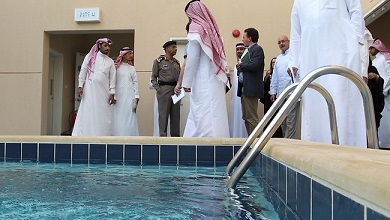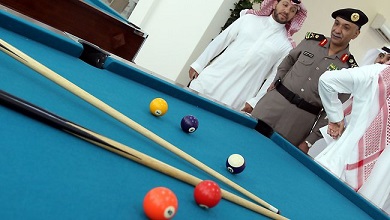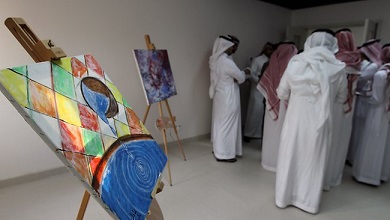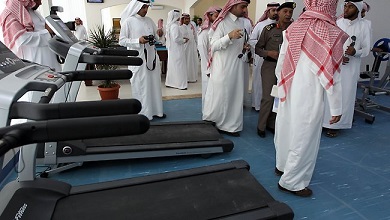It looks like you're using an Ad Blocker.
Please white-list or disable AboveTopSecret.com in your ad-blocking tool.
Thank you.
Some features of ATS will be disabled while you continue to use an ad-blocker.
2
share:
It doesn`t take much imagination to think of which would be the better deterrent to terrorists out of the Saudi`s spa treatment or the US Guantanamo
Bay style treatment imo,that if they were serious about ridding them from their country or to send a message that they oppose terrorism one would
think they`d adopt a harder line.
Fancy a dip?

Rack em up?

Feelin creative today?

I kinda feel spoilt, can`t get too flabby now, can we?

What next 70 pole dancing virgins?
Sounds more like a reward or recruiting to me.
How others are treated who are not al-Qaida...
Ali Al-Khawahir, Saudi Man, Sentenced To Be Paralyzed In 'Eye For An Eye' Justice
Saudis sentence Australian man to 500 lashes for blasphemy
Saudi seven face crucifixion and firing squad for armed robbery
Saudi Arabia: Woman Sentenced For Driving A Car
etc etc...
Enough to make me sick
SAUDI Arabia is hoping to wean jailed al-Qaida militants off religious extremism with counselling, spa treatments and plenty of exercise at a luxury rehabilitation centre in Riyadh.
In between sessions with counsellors and talks on religion, prisoners will be able to relax in the centre's facilities, which include an Olympic-size indoor swimming pool, a sauna, a gym and a television hall.
The new complex is the work of the Prince Mohammed bin Nayef Centre for Counselling and Care, a body set up seven years ago to rehabilitate extremists jailed during a Saudi crackdown on the local branch of al-Qaida.
www.perthnow.com.au...
Fancy a dip?

Rack em up?

Feelin creative today?

I kinda feel spoilt, can`t get too flabby now, can we?

What next 70 pole dancing virgins?
Sounds more like a reward or recruiting to me.
How others are treated who are not al-Qaida...
Ali Al-Khawahir, Saudi Man, Sentenced To Be Paralyzed In 'Eye For An Eye' Justice
Saudis sentence Australian man to 500 lashes for blasphemy
Saudi seven face crucifixion and firing squad for armed robbery
Saudi Arabia: Woman Sentenced For Driving A Car
etc etc...
Enough to make me sick
The Saudi's give terrorists everything they need and send them off to Syria. Disgusting dictatorship who need bombs dropped on all their palaces.
reply to post by DarknStormy
It wouldn`t surprise me if the luxury spa (they call a prison) is where the battle weary al-Qaida go to get some R&R before heading on out into the field again.
It wouldn`t surprise me if the luxury spa (they call a prison) is where the battle weary al-Qaida go to get some R&R before heading on out into the field again.
I've vaguely heard of this prison. If I recall correctly, I believe it actually has a very high rate of success for rehabbing.
If anyone could dig up more info on it, that would be great. I'm not sure where to look for unbiased info.
Edit: I misread, I thought the facility was over 7 years old. It is the group running it that is. I still maintain that I've heard of a Saudi rehab center for terrorists/extremists that seems to actually do as it promises.
If anyone could dig up more info on it, that would be great. I'm not sure where to look for unbiased info.
Edit: I misread, I thought the facility was over 7 years old. It is the group running it that is. I still maintain that I've heard of a Saudi rehab center for terrorists/extremists that seems to actually do as it promises.
edit on 4/20/2013 by Nyiah because: (no reason given)
reply to post by Nyiah
If that is true Nyiah shouldn`t they treat all criminals (some are just too ridiculous to call them that) the same as terrorists.? give them all luxury spa`s for a while.
That would be my main beef.
Death penalty crimes...
Yet these terrorists get luxury spa`s?
If others escape the death penalty there`s flogging to try and escape as well.
If that is true Nyiah shouldn`t they treat all criminals (some are just too ridiculous to call them that) the same as terrorists.? give them all luxury spa`s for a while.
That would be my main beef.
Death penalty crimes...
Saudi Arabia Is justice system based on Sharia law due to Islam being the official state religion.
The death penalty can be imposed for a wide range of offences[2] including murder, rape, false prophecy, armed robbery, repeated drug use, apostasy,[3] adultery,[4] witchcraft and sorcery[5] and can be carried out by beheading with a sword,[6] or more rarely by firing squad, and sometimes by stoning.
List of crimes
Saudi law allows the death penalty for many crimes. For example:
Adultery (Unmarried adulterers can be sentenced to 100 lashes, married ones can be sentenced to stoning.)
Apostasy (Apostates are sentenced to beheading but are usually given three days to repent and return to Islam.)
Armed robbery
Blasphemy
Carjacking
Drug smuggling
Fornication
Home invasion
Homosexuality (If a person is sodomized by his or her own consent, then he/she might also be sentenced to death)
Idolatry
Murder
Prostitution
Rape
Sedition
Sexual misconduct
Sorcery
Terrorism
Theft (fourth conviction)
Treason
Waging war on God
Witchcraft
en.wikipedia.org...
Yet these terrorists get luxury spa`s?
If others escape the death penalty there`s flogging to try and escape as well.
reply to post by gps777
Oh you're completely right, to treat & rehab one group but not the other is totally two-faced. If a terrorist can be rehabbed, so can a thief to a killer.
I'm very interested in the psychological treatments they're doing. If it works, why not apply the methods to other criminals?
Oh you're completely right, to treat & rehab one group but not the other is totally two-faced. If a terrorist can be rehabbed, so can a thief to a killer.
I'm very interested in the psychological treatments they're doing. If it works, why not apply the methods to other criminals?
reply to post by Nyiah
Maybe some of the families of loved ones lost due to the terrorists would have a hard time with it.
I think it would be good if it works or is working?,though hesitant to say that as I`m not directly affected.
Maybe some of the families of loved ones lost due to the terrorists would have a hard time with it.
I think it would be good if it works or is working?,though hesitant to say that as I`m not directly affected.
reply to post by gps777
Here's the Rehab for violent criminals in Saudi Arabia and maybe a few wound up at the prison you are speaking about also.
Makes me sick.. The Saudi government are rehabilitating those criminals because to the Saudi regime, they are useful idiots. Instead of them attacking Saudi allies, make them attack the enemies.
Now I have done a short stint in Jail here in Aus. We had a pool (it wasn't in use, never had water), We had a gym (No treadmills etc), we had a pool table (It was a piece of junk though), and forced labour .. Those terrorists are getting treated like f/ing kings.
Saudi war crimes
Here's the Rehab for violent criminals in Saudi Arabia and maybe a few wound up at the prison you are speaking about also.
The official, classified document shows that the authorities of Saudi Arabia have ordered the release of a group of the most dangerous criminals who have been sentenced to death in exchange for going to fight in Syria. Prior to their deployment to Syria the convicts are to be trained in unconventional warfare, terrorism, or in what is euphemistically described as Jihad.
The group of convicts includes 105 Yemeni, 21 Palestinian, 212 Saudi, 96 Sudanese, 254 Syrian, 82 Jordanian, 68 Somali, 32 Afghan, 194 Egyptian, 203 Pakistani, 23 Iraqi and 44 Kuwaiti citizens. It is unlikely that this group is the only such group that is going to be deployed from Saudi Arabia.
Makes me sick.. The Saudi government are rehabilitating those criminals because to the Saudi regime, they are useful idiots. Instead of them attacking Saudi allies, make them attack the enemies.
Some of the killed or captured Turkish convicts had ties to Al Qaeda associated organizations. One of the more prominent among these convict insurgents was the brother of the leader of the 2003 HSBC bombers. The bombing of the HSBC bank in Istanbul in 2003 killed 67 and wounded more than 700 people. The Saudi document indicates that the forced use of prisoners in Saudi Arabia and Turkey is part of a GCC-NATO strategy rather than isolated incidents.
Now I have done a short stint in Jail here in Aus. We had a pool (it wasn't in use, never had water), We had a gym (No treadmills etc), we had a pool table (It was a piece of junk though), and forced labour .. Those terrorists are getting treated like f/ing kings.
Saudi war crimes
reply to post by DarknStormy
Thanks for the link DarknStormy,its quite an eye opener,and shocking (though not surprising) that nothing is being done about.
Thanks for the link DarknStormy,its quite an eye opener,and shocking (though not surprising) that nothing is being done about.
reply to post by gps777
As long as their happy getting their hair permed and their manicures before they die, I'm happy
As long as their happy getting their hair permed and their manicures before they die, I'm happy
new topics
-
The daily fail trying to imply “it’s aliens”
The Gray Area: 3 hours ago -
Swarms of tiny 'ant-like' robots lift heavy objects and navigate obstacles
Science & Technology: 4 hours ago -
NYPD Chief Jeffrey Maddrey Resigns - Forced Officers to Give Sex for Overtime Pay and Favors.
Posse Comitatus: 6 hours ago -
The Carpet Coating that Attacked the Environment
Medical Issues & Conspiracies: 10 hours ago -
Microplastics in your drinks
Medical Issues & Conspiracies: 11 hours ago
top topics
-
The Carpet Coating that Attacked the Environment
Medical Issues & Conspiracies: 10 hours ago, 11 flags -
China Working on 'Drone Mothership' Plane
Military Projects: 16 hours ago, 10 flags -
Microplastics in your drinks
Medical Issues & Conspiracies: 11 hours ago, 5 flags -
Happy Rush Day 2024 - 2112
Music: 16 hours ago, 4 flags -
NYPD Chief Jeffrey Maddrey Resigns - Forced Officers to Give Sex for Overtime Pay and Favors.
Posse Comitatus: 6 hours ago, 3 flags -
Swarms of tiny 'ant-like' robots lift heavy objects and navigate obstacles
Science & Technology: 4 hours ago, 2 flags -
The daily fail trying to imply “it’s aliens”
The Gray Area: 3 hours ago, 1 flags
active topics
-
'Mass Casualty event' - Attack at Christmas market in Germany
Mainstream News • 137 • : gortex -
Microplastics in your drinks
Medical Issues & Conspiracies • 17 • : Dalamax -
Why isn't Psychiatry involved?
Social Issues and Civil Unrest • 29 • : GENERAL EYES -
An Interesting Conversation with ChatGPT
Science & Technology • 33 • : GENERAL EYES -
The daily fail trying to imply “it’s aliens”
The Gray Area • 1 • : BeyondKnowledge3 -
Just spotted an unusual aircraft Melbourne Australia
Aliens and UFOs • 7 • : Cavemannick -
Swarms of tiny 'ant-like' robots lift heavy objects and navigate obstacles
Science & Technology • 2 • : BeyondKnowledge3 -
Post A Funny (T&C Friendly) Pic Part IV: The LOL awakens!
General Chit Chat • 7942 • : imitator -
Drones everywhere in New Jersey ---and Elsewhere Master Thread
Aliens and UFOs • 221 • : imitator -
Donald Trump Should Offer AMNESTY to the BIDEN FAMILY For Indicting Blackmailers-Controllers.
US Political Madness • 78 • : WeMustCare
2
